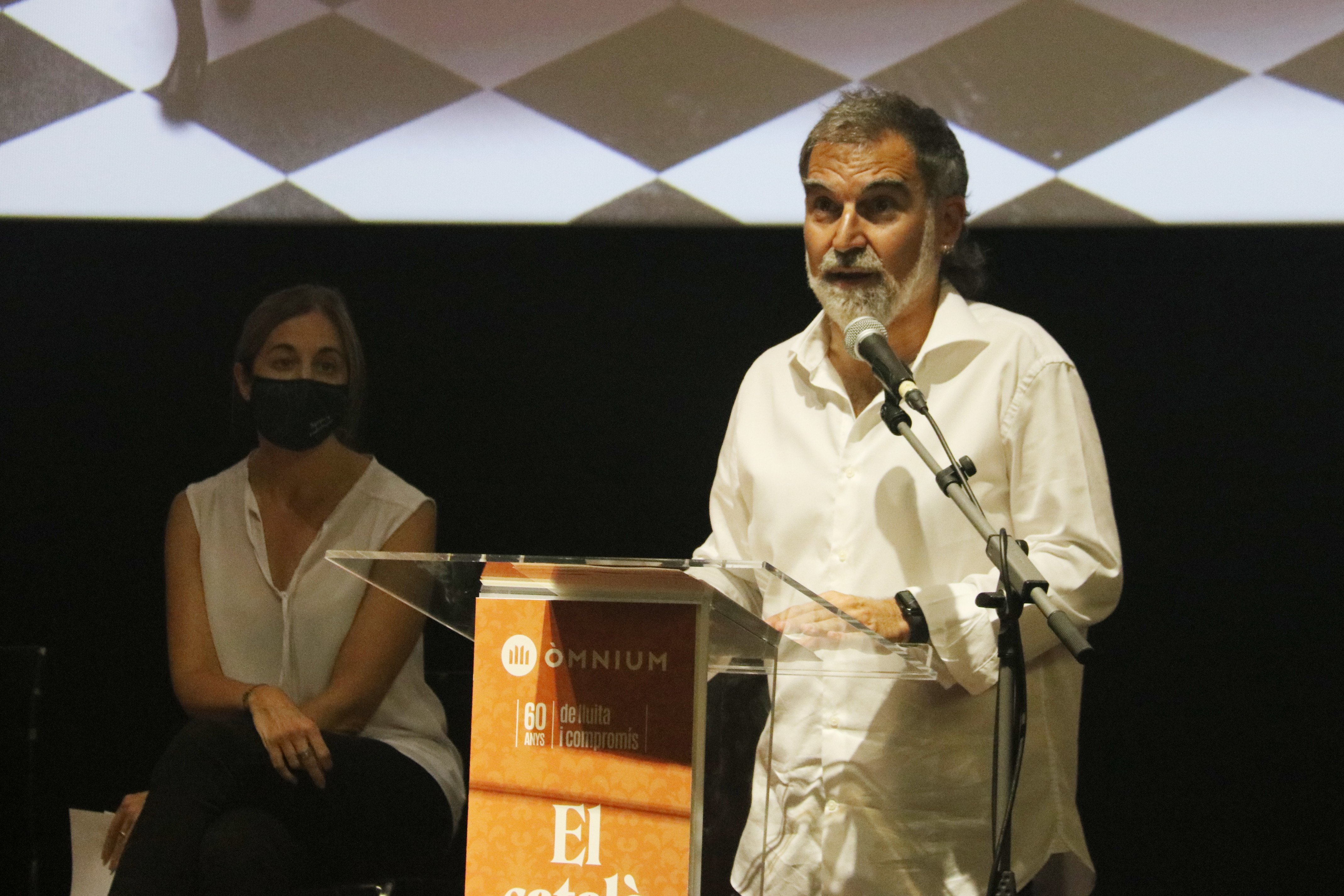An audiovisual content factory, a voice bank and a reformulation of the old language exchange idea. These are some of the initiatives presented this Tuesday by Òmnium Cultural to counter the linguistic attacks and challenges faced by the Catalan language.
The president of the major Catalan cultural entity, Jordi Cuixart, was one of those present at the Catalan Filmoteca to introduce the campaign based on the slogan El Català Es Teu - "Catalan is Yours" - in which the organisation called on Catalans to put their energy into supporting Catalonia's language, asking people to make the language "their own" in all spheres of daily life, and especially among young people and newcomers to Catalonia.
Cuixart has announced that Omnium is launching a three-pronged line of action to reinforce what it says is one of the main consensus elements of Catalonia, its language: "It is an element of cohesion and collective self-esteem in the face of the unifying will of a Spanish state that has renounced its cultural and linguistic diversity".
Cuixart announced the intention to hold a series of conferences inspired by the great International Language Congresses held in 1906 and 1986 with experts and linguists. He also said that Òmnium wants to remain an agent of pressure against the attacks suffered by the Catalan language, both from the judiciary and from governments. And in this sense he announced that in the coming weeks a major action will be held to reject the Spanish audiovisual law which does not protect Catalan or other minoritized languages of the state.
More audiovisual content and more movies
In terms of the Catalan language as cohesion, Òmnium plans to promote a project entitled 'Cultural Tandem', aiming to renew the concept of language exchange pairs, bringing together Catalan speakers and newcomers to Catalonia, and also emphasizing the fact that there is cultural exchange beyond the language learning that takes place.
In the audiovisual sphere, Òmnium's proposal is to create a large audiovisual content factory with the aim of also making Catalan a language to opt for in people's leisure choices. Cuixart explained that more details of this initiative will be given in the coming weeks, but pointed out that the challenge will be to generate quality content in the Catalan language.

The president of Òmnium Cultural, Jordi Cuixart, at the presentation of the campaign El Català Es Teu - 'Catalan is Yours' - ACN
Another project to be developed is the creation of a major voice bank, to be created mainly through the participation of Òmnium's own members. The aim is to bring together as many dialectal variants as possible and make a powerful bank, which will be available to large companies and thus ensure that Catalan speakers can communicate using electronic devices in their own language.
For the key area of young people, the cultural organization intends to double the presence of children's cinema in Catalan, with a plan to even hold projections at Òmnium centres. As well, a linguistic initiative in the sports sphere is being developed through an agreement with the Catalan union of sporting federations, UFEC.
Always a priority for Òmnium
The vice-president of Òmnium, Clàudia Pujol, also spoke at the presentation of the campaign, recalling that one of Òmnium's priorities has always been the defence of the Catalan language, even from the organization's clandestine days during the Franco dictatorship. Òmnium does not want the Catalan language to go backwards, but to move forward, which is why in recent years it has allocated almost half of its budget to linguistic and cultural projects.
In fact, the campaign spot broadcast by the organization talks about advancing Catalan. It uses dolphins as a symbol of the Catalan language and explains that it will only stay alive if it keeps moving.
Decline of Catalan
The sociolinguist Marina Massaguer also spoke, recalling that the current state of Catalan is worrying. She specified that when the Catalonia's normalization policies began - aimed at restoring Catalan use throughout society after the linguistic repression of the Franco dictatorship - 50% of the population of Catalonia used Catalan on a regular basis, but that currently the figure is around 30% among initial speakers and 36% for regular speakers of the language.
"To guarantee a good future for the language, more people must join the Catalan language," explained Massaguer, who also explained that many people who would like to learn Catalan do not have access, especially in the informal sphere. And hence the importance of promoting it in the fields of leisure and audiovisual consumption.
"We need to break this circle of minoritization," she said, asserting the need to guarantee all rights of Catalan speakers, especially those of children and young people, who are those who "have the capacity to transform the linguistic reality of the future," she added.
Main image: The president of Òmnium Cultural, Jordi Cuixart / ACN

